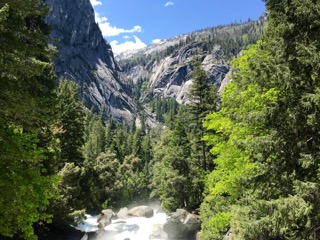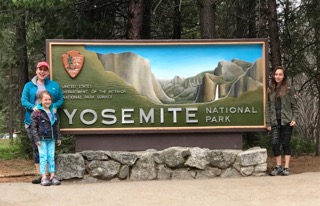The first Saturday morning in June, before most of us were even out of bed, 31-year-old Alex Honnold crested the 3,000-foot peak of Yosemite’s El Capitan as a free soloist – a feat of such significance that expert climbers have likened it to landing on the moon. And even more impressive, he accomplished the climb in just under four hours.
I’ve poured over the limited coverage from Alex’s Saturday climb, marveled at his El Capitan accomplishment with my family and have chatted with a coworker whose hands literally got sweaty just reading about the climb. And what I’ve come to realize is that Alex Honnold embodies a value that we share at stable|kernel – “We Stay Hungry.” We work hard to hold true to these values and hope our employees will feel a deeper sense of meaning in all of their pursuits in doing so. I found it hard to ignore the example that Honnold set for us in accomplishing such a remarkable feat with integrity and grace intact.
For starters, one must understand what makes Honnold so unique. If you don’t follow the sport of climbing you might be thinking, “I’m sure I’ve heard of people climbing El Capitan before,” and you would be right. In fact, from the green meadow below the dramatic granite outcrop, visitors often gather with binoculars pressed to their faces, marveling over the seemingly minuscule climbers who are dangling by ropes or those who have paused their climb to rest in suspended sleeping shelters midway up the rock’s face.
But Honnold is different. As a free soloist, he doesn’t rely on the climbing assistance of other people or even on harnesses, ropes or protective equipment that would save him from the certain death of a fall. When Alex climbs, it involves only a man and a mountain.
Much of what I knew about Honnold was thanks to a National Geographic documentary Alone on the Wall, capturing his extraordinary record-setting free solo climb of Yosemite’s Half Dome nine years ago. In fact, the documentary was shown at the Evergreen Lodge where my family stayed just outside of Yosemite last Tuesday night and me, my husband and our two daughters were slack-jawed and riveted by his story. Alex’s humble demeanor, the ridiculously difficult conditions of the Half Dome climb, and his ability to stay focused on the next placement of his hands and feet (and not on the thousands of feet of rock looming below him) captivated us. Little did we know that he was just down the road that night, likely sleeping in his van and preparing to tackle El Capitan.
Here are the 3 key lessons I’ve taken away from Alex about practicing the “We Stay Hungry” value both professionally and personally.
 Yosemite National Park
Yosemite National Park
Related: Learn all about our values at stable|kernel
What you learn today will prepare you for tomorrow
Alex didn’t just wake up one day and conquer El Capitan. For this specific climb, he explained to National Geographic that he trained for more than a year at different sites in the United States, China, Europe and Morocco. And remember when he free soloed Half Dome? He was 23 and had already been climbing for about 12 years. Alex has mindfully used his experiences to prepare himself for each new challenge.
[Alex] is obsessive about his training, which includes hour-long sessions every other day hanging by his fingertips and doing one and two-armed pullups on a specially-made apparatus that he bolted into the doorway of his van. He also spends hours perfecting, rehearsing and memorizing exact sequences of hand and foot placements for every key pitch. He is an inveterate note-taker, logging his workouts and evaluating his performance on every climb in a detailed journal.
Most goal-driven people have bumped up against the feeling that their penultimate accomplishment might be close to unreachable, and Honnold is no exception. Alex recalls that when he initially mapped out his climb, he found many sections to be cringe-worthy. But through diligent practice and preparation, Honnold says he continually, “pushed my comfort zone and made it bigger and bigger until these objectives that seemed totally crazy eventually fell within the realm of the possible.” In this way, Alex reminds us to be mindful as we approach what each day can teach us. By adopting such a growth mindset, challenges ahead of us gradually become less daunting because we are better prepared to conquer them.
No man is an island
Even Honnold – a free soloist who usually lives alone in a van and thrives on climbing alone – finds strength in his relationships with others. Alone on the Wall captures some heartwarming exchanges between Alex and his mom (an ardent fan of her son, despite not fully understanding his projects) and illustrates the bond shared between climbers (several of whom knew about the El Capitan excursion, but who were sworn to secrecy). Honnold explains that when he’s climbing he usually filters everything, except for his next move, out of his mind. However, during his trek up El Capitan, he acknowledged, “the whole village of people” who have supported him in his vision. He also reflected on an encouraging email that was sent to him that morning by friend and climbing legend Conrad Anker.
Honnold also formed close and trusting relationships with the National Geographic crew who documented him over the years, and he mentions in a post-climb interview that when he reached the top of El Capitan they were “stoked” together and exchanging lots of hugs of celebration. Lucky for us, the National Geographic team will be releasing a documentary about Honnold’s El Capitan climb.
Like Alex, the journeys we take to reach our goals are often solitary. But the value in having a network of people that understand what you want to accomplish, who will cheer you on when the going gets tough, and who will be “stoked” with you when you achieve a win, can’t be overstated.

There is always another mountain to climb.
Given that El Capitan is truly the pinnacle accomplishment of free soloing, one of the first questions my family had after news of Honnold’s accomplishment was, “what could Alex possibly try to do next?” Not surprisingly, Honnold had already been considering this. In a post-climb interview, he explained that while there may not be much left in terms of free soloing challenges, he’s eager to master a 9a climb (9a refers to one of the highest-rated, most physically demanding levels of sports climbing). Frankly, I’m glad he’s considering that over scaling the inside of an active volcano, as was suggested by my 8-year-old!
Alex leaves us with some words of wisdom about staying hungry:
It’s been a strategy the whole time I’ve worked on El Cap to look past it, so that it’s not just all this one moment. To think about what’s beyond, what other stuff I’m excited about. So this just feels like a semi-normal day […] Just because I’ve achieved a dream doesn’t mean that I just give up on the best version of me. I want to be the guy that trains and stays fit and motivated. Just because you finish a big route doesn’t mean that you just quit.
Now that we now what Alex Honnold will do next, I guess it’s time to ask ourselves which proverbial mountain we will climb next. I hope you’ve stayed hungry for your next win, and I wish you well on your journey!
